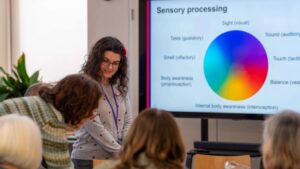A committee of MPs has set out a 48-point plan to solve the SEND crisis in England, with proposals for national SEND standards and mandatory training.
 The Parliamentary education committee published a report in September 2025 which recommends a series of policies to improve SEND (special educational needs and disabilities) support in education.
The Parliamentary education committee published a report in September 2025 which recommends a series of policies to improve SEND (special educational needs and disabilities) support in education.
The report asserts that the government should set out the minimum resources, specialist expertise and equipment allocated to every school in the country to support pupils with SEND, while increasing accountability.
The Committee also urged the government not to withdraw statutory entitlements from children and young people with SEND after concerns were raised that Education, Health and Care Plans (EHCPs) could be scaled back or even scrapped.
In response, Sir Keir Starmer’s government said it would focus on increasing the inclusivity of mainstream education in its upcoming reforms, which are due to be set out in a whitepaper published later this autumn.
Ensuring inclusive mainstream education to support pupils with SEND
 But the report’s authors have criticised the government for failing to define what it means by “inclusive education” and argued that it lacks “a clear understanding of the timescale and level of investment that is needed to achieve a truly inclusive mainstream education system.”
But the report’s authors have criticised the government for failing to define what it means by “inclusive education” and argued that it lacks “a clear understanding of the timescale and level of investment that is needed to achieve a truly inclusive mainstream education system.”
Their recommendations for ensuring inclusive mainstream education include:
- Establish national standards and expectation for SEND provision and support in schools, providing a “consistent baseline to help education settings become more inclusive”
- Publish statutory requirements for the minimum level of resources, specialist expertise and equipment that every educational setting must have access to as part of their offer of SEND support
- Publish a definition of inclusive education and a rationale for this vision alongside examples of good practice from across different phases of education and settings by the end of the year
- Provide a detailed implementation plan to expand the use of resource bases to increase specialist provision in mainstream schools
- Publish mandatory standards of good practice, covering physical facilities and equipment and good practice approaches to integration with the wider school community
More funding needed to improve SEND provision
 The committee also believes that the current £6,000 notional SEND funding for schools should be automatically increased annually in line with inflation, and warns that the government may need to partially write off council SEND-related deficits, which are on course to hit £5 billion next year.
The committee also believes that the current £6,000 notional SEND funding for schools should be automatically increased annually in line with inflation, and warns that the government may need to partially write off council SEND-related deficits, which are on course to hit £5 billion next year.
Other recommendations made around funding include:
- Assess the level of funding required to implement meaningful SEND reforms as a priority, and publish a plan for how this level of investment will be delivered in both the short and medium term
- Complete a cost-benefit analysis to understand the short and long term economic benefits of investing in a fully inclusive education system
- Complete an urgent review of the National Funding Formula to ensure funding is allocated fairly and reflects the real level of need across the country
- Redirect a greater share of high needs funding towards early identification and support within mainstream settings and through multi-agency services
MPs also want better integration across the NHS and other organisations and agencies to improve support. They say that children with SEND should be provided with support as soon as a need is identified, rather than being made to wait until an EHC plan is officially in place.
The report also recommends that the government engages with Ofsted to ensure inclusive education and robust SEND support.
MPs state that the government and the regulator need to work together to ensure that the inclusion criterion within the new Ofsted inspection framework is robust, measurable and reflective of the experiences of all pupils, particularly those with SEND. Inspections should also incorporate metrics such as the proportion of pupils with SEND on roll, their attendance rates, exclusion figures, school swaps, progression and attainment, they argue.
MPs call for mandatory SEND training in schools
 Other recommendations made by the committee to improve SEND provision across the country include mandatory SEND training and higher qualifications:
Other recommendations made by the committee to improve SEND provision across the country include mandatory SEND training and higher qualifications:
- All new headteachers should hold a SEND-specific qualification within four years
- Continuously review and update teacher training to ensure it remains relevant and effective
- Provide comprehensive training within ITT and clear guidance for schools, multi-academy trusts and education staff on delivering inclusive education in practice
- Make SEND CPD mandatory to ensure all educators are equipped to meet the diverse needs of children and young people with SEND
- Make it mandatory for at least one member of the senior leadership team in every school and every multi-academy trust (MAT) to hold a SENCO qualification
- Embed expertise within schools and MAT governance structures by making it mandatory to appoint governors or trustees with specific responsibility for, and relevant expertise within, SEND. This could include lived experience
- Introduce mandatory, comprehensive SEND training for all Ofsted inspectors
Chair of the Committee, Helen Hayes, said that making sure every child in the country with SEND can attend a local school that properly meets their needs “will require a root and branch transformation.”
She added:
“SEND must become the business of every frontline professional in educational settings, with in-depth training at the start and throughout the careers of teachers, senior leaders and teaching assistants.”
The Education Secretary has previously pledged to “strengthen and put in place better support for children,” and insisted she has been listening to parents and campaign groups when drafting plans.
Calls for mandatory learning disability and autism training for education
 One thing that could help ensure better understanding, support and appropriate provision for many children and young people with special educational needs and disabilities is tailored training on learning disabilities and autism.
One thing that could help ensure better understanding, support and appropriate provision for many children and young people with special educational needs and disabilities is tailored training on learning disabilities and autism.
The Oliver McGowan Mandatory Training Framework on Learning Disability and Autism is having a significant, valuable impact in healthcare, with senior doctors describing the training programme as potentially life-saving.
The co-delivery approach adopted by Oliver’s Training, which sees an experienced Facilitating Trainer co-delivering the programme with two Expert Co-Trainers – one with lived experience of a learning disability, and another with lived experience of autism – could also be beneficial in education.
Oliver’s mother, Paula McGowan, has been campaigning for this training to be made mandatory for the education sector for some time.
Paula’s hard-fought campaign for better training in learning disabilities and autism for healthcare staff culminated in the passing of the Health and Care Act 2022. This piece of legislation created the statutory requirement for all healthcare staff to undergo training in learning disabilities and autism, with the Oliver McGowan Mandatory Training framework being identified as the government’s preferred and recommended training route.
In 2023, she launched a petition calling for all staff in education settings to also be trained on learning disabilities and autism.
Children with SEND ‘deserve better’
Writing for Schools Week back in July 2023, Paula explained:
“Too many neurodivergent students have negative experiences of school. Too many are excluded or unable to attend due to traumas suffered at school. These can lead to mental health issues, self-harm, suicidal ideation and PTSD.
“Students who have a learning disability or who are autistic deserve to be taught by staff who understand and can fully support their needs and who accept and value them for who they are rather than expecting them to conform to neurotypical standards.
“And teachers deserve better too, especially in a system that is so short of special school places and is placing more and more children with higher needs in mainstream schools. They deserve to be given skills to do the job that is required of them: to make reasonable adjustments, to adapt their communication and their environments, to understand sensory crisis, overload, anxiety, and masking, and to recognise and neutralise their own unconscious biases.
“The numbers speak for themselves. A report by the National Autistic Society (NAS) shows that just 14% of teachers have received autism training. This is a shocking statistic considering that 73% of the 180,000 autistic pupils in England are educated in mainstream schools. According to NAS, autistic children are twice as likely to be excluded from school when teachers do not receive appropriate training.”
“Indeed, 54% of autistic students said having teachers who don’t understand them is the worst thing about school, and seven in 10 said school would be better if more teachers understood autism.
“The Oliver McGowan Mandatory Training for health and care – designed, evaluated and delivered by autistic people and those who have a learning disability – could easily be adapted for educational settings.
“It is crucial that we learn directly from these communities if we are to avoid unnecessary exclusions and improve the mental wellbeing of autistic and learning-disabled pupils.”
She also acknowledged that many school leaders and teachers also “want to provide an education that fully embraces and enriches the learning of pupils with special educational needs and disabilities and make their environments more accepting and inclusive.”
Successful delivery of the Oliver McGowan Mandatory Training
 First Response Training (FRT) was one of the first training providers in the country to be approved to offer essential training in line with the Oliver McGowan Mandatory Training on Learning Disability and Autism.
First Response Training (FRT) was one of the first training providers in the country to be approved to offer essential training in line with the Oliver McGowan Mandatory Training on Learning Disability and Autism.
The national training provider aims to empower and educate staff to transform their practice by embracing the lived experiences of autistic individuals and those with learning disabilities. Through the collaborative strength of their trios—facilitating trainers and experts with lived experience — FRT aims to inspire lasting change in how individuals are understood, supported, and valued.
Leon Williams, Lead Director at FRT, says:
“We must acknowledge the incredible work of Paula McGowan, whose tireless campaigning has led to this training becoming a statutory requirement for all health and social care staff. Through the tragic loss of her son, Oliver, meaningful change is being made to improve the quality and standards within health and social care.”
One of FRT’s valued Expert with Lived Experience Co-Trainers, Laura Amy Williams, adds:
“It gives me a lot of reassurance to know there are so many people who want to understand autism and autistic people. As an expert with lived experience, I feel I can simply be myself and share my story.”
 Since March 2023, FRT have delivered over 1000 Tier 1 webinars and over 700 Tier 2 courses. They have reached over 30,000 learners already, and will train many more in the coming months.
Since March 2023, FRT have delivered over 1000 Tier 1 webinars and over 700 Tier 2 courses. They have reached over 30,000 learners already, and will train many more in the coming months.
FRT are hosting a series of open, public Tier 2 courses in London, Manchester and Birmingham in the coming months. You can book a space on any of these courses online now.
FRT have also developed a free-to-download quick guide to the new Oliver McGowan draft code of practice.
This guide explains what the new code of practice means for health and social care providers, how to stay current, and how to meet new legal duties.
You can also download FRT’s free Oliver McGowan Mandatory Training brochure.
For further information on other types of neurodiversity training, visit FRT’s webpage or download the brochure.
You can contact FRT via freephone 0800 310 2300, send an e-mail to info@firstresponsetraining.com or submit an online enquiry.
